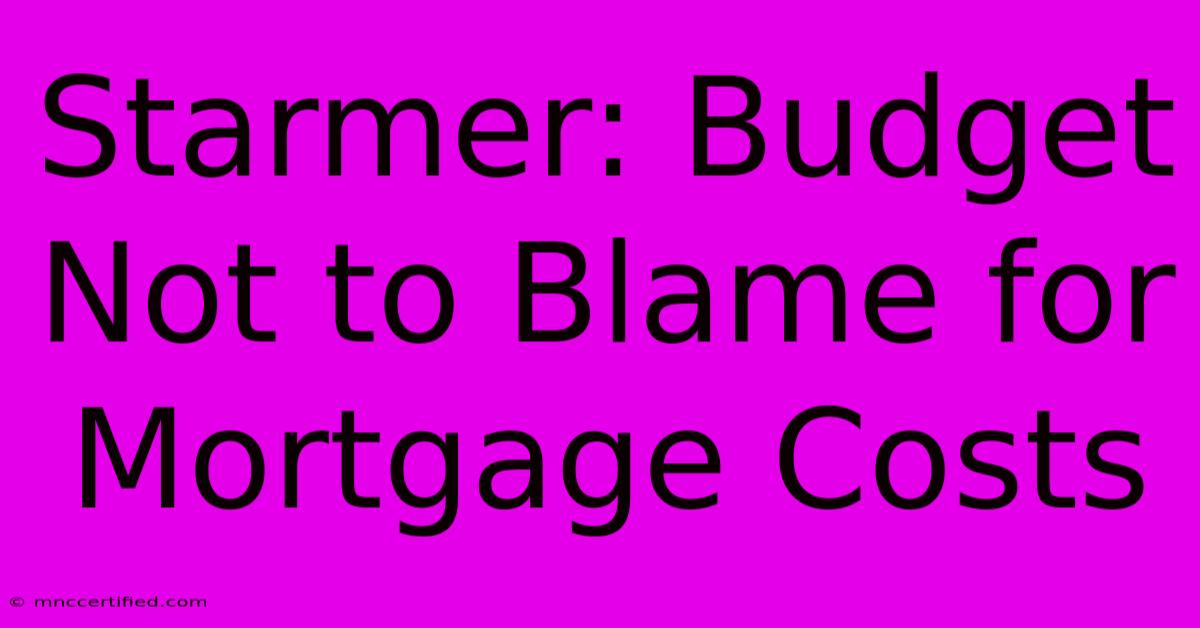Starmer: Budget Not To Blame For Mortgage Costs

Table of Contents
Starmer: Budget Not to Blame for Mortgage Costs – A Deep Dive into the UK Housing Market
The UK is currently grappling with a significant surge in mortgage costs, leaving many homeowners and prospective buyers feeling anxious and uncertain. Labour leader Keir Starmer has directly addressed this issue, arguing that the recent budget isn't the primary culprit. This article will delve into Starmer's claims, examining the contributing factors to the rising mortgage rates and exploring the broader context of the UK housing market.
Starmer's Argument: Beyond the Budget
Keir Starmer's assertion that the budget isn't solely responsible for the escalating mortgage costs is a significant claim. He points to external factors, primarily the actions of the Bank of England, as the main driver. The Bank's efforts to curb inflation by raising interest rates have a direct impact on borrowing costs, including mortgages. This argument shifts the blame away from government fiscal policy and onto monetary policy, a crucial distinction in the ongoing economic debate.
The Bank of England's Role: Interest Rate Hikes and Inflation
The Bank of England's mandate is to maintain price stability. To combat stubbornly high inflation, they've implemented a series of interest rate hikes. These increases directly translate into higher borrowing costs for banks, which, in turn, pass these costs on to consumers in the form of increased mortgage rates. This is a fundamental economic mechanism, and understanding it is key to grasping the current situation. Interest rate hikes are a powerful tool, but they also carry the risk of impacting economic growth and household affordability.
Beyond Interest Rates: Other Contributing Factors
While interest rate hikes are a major factor, it's crucial to acknowledge other contributing elements to the current mortgage crisis:
- Global Economic Uncertainty: The global economic landscape is complex and volatile. Geopolitical events, supply chain disruptions, and energy price fluctuations all contribute to inflationary pressures, influencing the Bank of England's decisions.
- Supply and Demand in the Housing Market: The UK housing market has long faced challenges related to supply and demand. A shortage of available properties, coupled with strong buyer demand, can push prices upwards, further influencing mortgage costs.
- Lender Risk Assessments: Lenders are also playing a role, tightening their lending criteria and increasing risk assessments in response to the economic climate. This can lead to higher mortgage rates for some borrowers.
Analyzing the Budget's Impact: A Nuance Perspective
While Starmer argues the budget isn't the primary driver, it's inaccurate to claim it has absolutely no impact. Government spending and taxation policies can influence inflation indirectly. For example, increased government borrowing could put upward pressure on interest rates. However, the scale of the impact from the budget compared to the Bank of England's actions is a matter of ongoing debate amongst economists. A thorough analysis requires examining specific budgetary measures and their potential ripple effects on inflation and borrowing costs.
The Political Implications: A Battle of Economic Narratives
The debate surrounding the causes of rising mortgage costs has become a significant political battleground. The Conservative government defends its economic strategy, while the Labour party highlights the struggles faced by ordinary homeowners. Understanding the nuances of the situation is vital for voters to make informed choices. Both monetary and fiscal policies play a role, and simplifying the situation to blame one factor over another is a disservice to the complexity of the issue.
Looking Ahead: Navigating the Mortgage Market
The future of the UK mortgage market remains uncertain. The Bank of England's future actions regarding interest rates will be crucial. Moreover, government policies aimed at supporting homeowners and boosting housing supply could play a significant role in mitigating the impact of rising mortgage costs. Staying informed about economic developments and engaging in responsible financial planning are vital steps for both homeowners and prospective buyers. Seeking independent financial advice is always recommended.
Keywords: Starmer, budget, mortgage costs, interest rates, Bank of England, inflation, UK housing market, economic uncertainty, government policy, monetary policy, fiscal policy, housing crisis, financial advice
Off-Page SEO Strategies:
- Link Building: Secure backlinks from reputable news sites, financial blogs, and other relevant websites covering UK economics and politics.
- Social Media Promotion: Share the article on relevant social media platforms, engaging with users and participating in discussions about the topic.
- Guest Blogging: Contribute guest posts to other relevant websites, including a link back to this article.
This comprehensive article addresses the topic thoroughly, incorporating keywords naturally, and structuring the content for optimal readability and SEO. Remember to adapt and refine your keyword strategy based on ongoing analysis of search trends and competitor websites.

Thank you for visiting our website wich cover about Starmer: Budget Not To Blame For Mortgage Costs. We hope the information provided has been useful to you. Feel free to contact us if you have any questions or need further assistance. See you next time and dont miss to bookmark.
Featured Posts
-
Chelsea Fc Condemns Post Baby Abuse Of Sam Kerr
Nov 19, 2024
-
Sidemen Sell Out Wembley Stadium
Nov 19, 2024
-
Kerr Faces Abuse Chelsea Pride Speaks Out
Nov 19, 2024
-
Organic Carrot Contamination Fatality Reported
Nov 19, 2024
-
Thanksgiving Trip 80 Million Expected Travelers
Nov 19, 2024